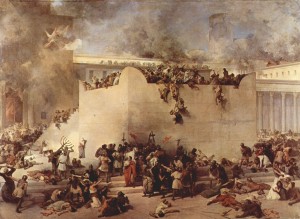If we were able to write down and count every word spoken at a Christian church during one Sunday, I’m pretty sure in most cases the absolute top words would be „salvation” and „save”
Most Christians think it is also one of the most common words in the Bible. Wrong. Not even close. The 5 most common words (except for prepositions, pronouns, conjunctions etc.) are: Lord (about 7400 times), God (4300), man (2700), Israel (2500) and people (2300). Several hundred positions down are save (241) and salvation (171).
Could this be a hint indicating that the Bible does not necessarily focus on what Christianity likes to focus today?
Regardless number count in the Bible, the subject of salvation is probably the most commonly spoken about in Christendom.
„Once you believe, you’re saved.”
„There is no salvation apart from Jesus.”
„All people in the world are either saved or not saved.”
„Salvation is by faith.”
„How can people get saved?”
Now if we ask Christians what it means to be saved, close to 100% of them will say it’s about going to heaven rather than hell after death. Does the Bible say that, too?
Let’s look.
Salvation in the Old Testament
These are the first 5 occurrences of the Hebrew word „Yeshua” (sounds familiar?) in the Old Testament.
I look for your deliverance, LORD (Genesis 49:18)
Moses answered the people, “Do not be afraid. Stand firm and you will see the deliverance the Lord will bring you today. The Egyptians you see today you will never see again. (Exodus 14:13)
The Lord is my strength and my defense he has become my salvation.(Exodus 15:2 a)
Jeshurun grew fat and kicked; filled with food, they became heavy and sleek. They abandoned the God who made them and rejected the Rock their Savior. (Deuteronomy 32:15 a)
Then Hannah prayed and said: „My heart rejoices in the LORD; in the LORD my horn is lifted high. My mouth boasts over my enemies, for I delight in your deliverance.(1 Samuel 2:1)
We can see that New International Version prefers the word „deliverance” rather than „salvation” (which we find in almost all older translations), and we may discover soon why they did this. For now let’s have a closer look at the verses.
The first one, from Genesis 49:18, it’s a kind of interlude spoken by Jacob in his last moments as he blesses his children and prophesies about the future of the tribes. We actually can’t tell for sure what kind of deliverance Jacob was talking about there. Probably from enemies like other nations, tribes.
The next two verses are only a page away from each other and we have no doubts what they are about – Egypt is oppressing Israel and salvation or deliverance means getting free from it.
In the fourth verse, from Deuteronomy, the discussed word is a part of the title given to God and is pretty general.
In 2 Samuel, Hannah praised the Lord for giving her a son after a long period of barrenness. The salvation she is talking about is then her restored fertility.
These are just 5 first examples of the term „salvation” in the Old Testament but I did check many more. The phrase salvation (literally „saving”) cannot be bound to a single meaning; it has a wide range of meanings, similar to English. A doctor can save someone’s life. I can save someone’s problem by fixing their mistake. Signing a peace treaty can save millions of people from distress or death that follow a war.
There is not one verse in the Old Testament that suggests salvation has anything to do with afterlife, but it shouldn’t be surprising as only New Testament talks about it. Let’s look there then. We’ll be looking at the first 5 occurrences of the word „sozo” – save.
Salvation in the New Testament
She will give birth to a son, and you are to give him the name Jesus, because he will save his people from their sins. (Matthew 1:21)
The disciples went and woke him, saying, „Lord, save us! We’re going to drown!” (Matthew 8:25)
She said to herself, „If I only touch his cloak, I will be healed.” (Matthew 9:21)
(the same word is used in the following Matthew 9:22, so I’ll skip it)
You will be hated by everyone because of me, but the one who stands firm to the end will be saved. (Matthew 10:22)
But when he saw the wind, he was afraid and, beginning to sink, cried out, „Lord, save me! (Matthew 14:30)
„Save” and „salvation” are very popular words in the New Testament, so there should be no surprise that the first 5 occurrences are in one book! Regardless, the context the word is used in is very different in almost all of the 5 cases.
In the beginning I suggested the Hebrew word „Yeshuah” should sound familiar… You may have heard it from a messianic Jew as this is how they often call Jesus. His Hebrew name would actually be „Yahushua” and means „Yahweh saves”, and this explains the word „because” from Matthew 1:21 (by the way, it would be nice if translators found a way to let us know about it).
The verse says that Jesus is going to save people from their sins – but what exactly does that mean? People will sin no more? There will be no punishment for sins? Nothing will be considered as sin? The verse and its immediate context don’t conclude that. Let’s look at the place sin is mentioned the first time in the Bible:
but you must not eat from the tree of the knowledge of good and evil, for when you eat from it you will certainly die (Genesis 2:17)
The idea that the sin is punished with death is repeated through the whole Bible, and is summarized by Paul in Romans (famous „wages of sin is death” – 6:23″). What kind of death is it about? Lots of Christians see eternal condemnation in hell – but you won’t find one verse that says that. It’s not a physical death, either – Adam did not physically die when he ate the forbidden fruit. Adam got separated from God – and this is the kind of death that explains both Genesis and Romans, and this is I believe what Jesus saves people from.
The second and fifth verse talk about saving from drowning. When we see a drowning person screaming, „Save me”, I don’t think anyone would start telling that person how one can go to heaven when they die. Clearly – the context says nothing about afterlife.
In Matthew 9:21 the context is very clear – „sozo” means heal, and „heal” is the word most of current translations use. No afterlife, either.
Now, let’s stop for a moment longer with 10:22.
„Who stands firm to the end will be saved” is a Biblical phrase which is pretty popular among theologians, mostly in context of the question whether a saved person can lose their salvation or not. There is a doctrine called „OSAS” – once saved, always saved – and Matthew 10:22 is one of the key arguments against it. You need to stand firm in your faith/deeds (depending on theological option), or you will go to hell.
Let’s read the context of Matthew 10, what is Jesus talking about?
Chapter 10 starts with giving the 12 apostles powers of healing and driving out demons, then Jesus tells to preach the message of the Kingdom of Heaven.
Beginning with verse 16, Jesus starts warning the apostles about persecutions they can meet – flogging, imprisonment, even death – this all can happen to them for proclaiming the Gospel. Let’s look at the verse with its immediate context:
Brother will betray brother to death, and a father his child; children will rebel against their parents and have them put to death. You will be hated by everyone because of me, but the one who stands firm to the end will be saved. When you are persecuted in one place, flee to another. Truly I tell you, you will not finish going through the towns of Israel before the Son of Man comes (Matthew 10:21-23)
Is this paragraph giving you any hint Jesus speaks about afterlife?
I know, this is what’s preached in the very most churches and what the very most Christians believe. But who cares about majority? Just because billions of flies enjoy licking feces, does it mean that we should do it as well? Truth counts, not what others believe or do.
Before we understand any part of the Bible, we have to abandon our previous beliefs and notice exactly what the text says, reading it as if we never read it before. Otherwise, we won’t be reading the Bible. We’ll be reading our beliefs into the Bible. And that is the main reason for the existence of so many Christians denominations.
The most common way to understand Matthew 10:22 is „who stands firm in their deeds/belief system till they die will be saved from eternal punishment in hell” but note, such words are not there. Note the context! No one is asking, „Lord, what will happen when we die? Shall we fry when we die? Is there a way out from the eternal suffering after we die?” Jesus is sending the apostles for a mission, here, on earth; He is talking about persecutions, here, on earth.
It should be clear by now that the words „save” or „saving/salvation” do not have one specific meaning, as in Greek, as in English. If I say to you, „Save me!” it may mean lots of things, depending on situation – lending money, feeding me, clothing, talking to someone about my situation, giving me a ride – I can go on and on. To tell what „saving” means, we always need to see the context!
And the context applies to a very specific time, place and people. In Matthew 10 it’s quite simple: the time – first half of first century; place – Near East (we could be a more specific, but it is in the Near East for sure); people – Jews. Neither applies to us.
One of the interpreting rules of the Bible (and not only the Bible) is that we do not read more than the text says. The largest part of the Bible is the stories – and while from them we can always draw conclusions and lessons for us, we can’t apply all words directly to us. Matthew 10:22 is exactly the case. Jesus was talking about fleeing death and persecution, not hellish fire!
Many theologians (like J.W. McGarvey, Albert Barnes, F.F. Bruce, D.A. Carson or Theodor Zahn) believe Jesus is talking about the First Jewish-Roman war, with its culminating point – destruction of Jerusalem in AD 70.
I can’t find a better explanation. There are many hints in Matthew 10 – and other parallel passages like – Matthew 23-25, Luke 17) indicating beyond doubts that all the warnings and threats Jesus told indeed regarded situations that were supposed to happen within some years – not millenniums – from then. Let’s read this verse:
Truly I tell you, all this will come on this generation. (Matthew 23:36)
Christian theologians show an amazing amount of imagination by trying to explain to us how „this generation” can still apply today. They say it can mean Israel as nation… people in general… Look then at Matthew 16:38:
Truly I tell you, some who are standing here will not taste death before they see the Son of Man coming in his kingdom (Matthew 16:38)
Could it be said any clearer? I don’ think so. And if you read whole chapters 10, 16 ans 23, you will see they all contain very similar warnings to the followers of Jesus and woes to enemies of the Gospel.
The conclusion is simple – in Matthew 10:22 the word „saved” again has nothing to do with something that will happen after we die. It is about being rescued from what is going to happen in about 40 years.
Please, take some time to look up the word „save” in Concordance or on a website like „Biblehub.com” or „Biblegateway.com”. Look in the whole Bible and find one – just one – reference – where beyond doubts it means salvation from suffering after death. Just one!
You won’t.
What then does the term „save” mean?
There isn’t just 1 answer. There are many. In the Old Testament, salvation usually meant a physical rescue from an enemy, In Gospels – saving from the deadly siege of Jerusalem, in some of the Epistles – restoring a love relationship between people and God. In the whole Bible, „save” and „salvation” lots of times refer to healing from a sickness.
If you were taught to believe the common Christian theology, it will definitely take some time until you stop seeing „salvation” as saving from hellfire. It took me years.But it’s definitely worth it. The Bible should make much more sense then.
If I were to name the most helpful thing that ever happened to me, I would say – it was when I realized that the Bible was much more focused on its direct listeners, not us.
Have you ever seen the acronym „BIBLE = Basic Instructions Before Leaving earth?” It does mention earth… but in the sense of leaving it. Most of Christians like to see afterlife as the „real” world and life on earth as a prelude, introduction, something we should not focus on. The main focus is, as the acronym points out, what it’s going to be when we leave earth. Shall we be saved or not? Salvation – that’s what it’s all about.
The numbers I gave in the beginning – about the most common words in the Bible in comparison to the words „save” and „salvation” bear an important message. Even if salvation was about afterlife, we can’t see much focus the Bible gives to it. History and narration make 60% of the Bible – all about this life! End times prophecy is only about 2%, and there is a growing number of theologians who believe this number is actually close to zero.
Let’s face the facts! The Bible has instructions how to live on earth and make this life meaningful, hardly mentioning the obvious fact we need to leave one day. One more time – no one in the entire Bible worries about afterlife!
Most of Christians do not have a problem calling „irrelevant to us” the passage that tells us to stone to death for adultery (Leviticus 20:10) but they are quick to call me „misled” when I say that the mission of Jesus was directed only to Israel even though Jesus Himself said it (Matthew 15:24).
I do believe the Bible is absolutely trustworthy but the very, very most of it is not directed to us and only after a thorough exegesis and interpretation we can formulate lessons for our lives. Do you agree that the commandments of stoning for adultery is not directed at us? Good! The same with the warnings Jesus gave about upcoming destruction! The same about the 7 letters to Churches at the beginning of Revelation! The same about threats from Hebrews (which will be analyzed in the next chapter)!
Today millions of devoted Christians have problems falling asleep, thinking, „Am I saved?”. Please, sit down for one minute and carefully note this simple fact – no one in the Bible asks this question. No one worries. And many verses indicate today no one can answer, „No” to this question anyway. Jesus is called the Savior of the world (1 John 4:14)!
(last modified – 2016-02-15)







